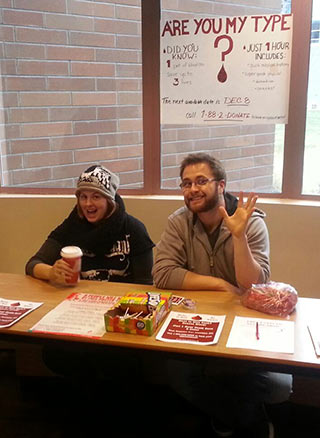By Pam Erikson, fourth-year English major
Current popular rhetoric questions the importance of a philosophy course as part of a job-ready education, but Dr. Jeff McLaughlin’s fourth-year Biomedical Ethics class challenged that notion by actually applying ethics instead of just talking about it.
McLaughlin, who has taught applied ethics at TRU for 23 years, wanted to challenge himself as well as his students with a hands-on group project based on current ethics issues. The project was developed collaboratively, with students presenting, and then voting on, ideas for important ethical issues in medicine.
The class chose blood donation and organ donation—hot topics in the media, from shortages to overseas transplants—and split into two groups of 15 to come up with solutions to the issues, and put their solutions into action.
Fourth-year philosophy majors Lyndsay Helfrich and Craig Trarup participated in the blood donation group, which recruited donors with the slogan “Are You My Type?” at information tables in Old Main and A&E in November. Sharing facts about blood donation and the steps to giving blood, the group garnered close to 100 donors.
“It was really cool to know that we’re exposing this little…moral oversight,” said Trarup. “People expect to have access to the blood, but blood only comes from one place right now, and that’s all of us.”

Philosophy students raised awareness on campus about the ethics issues around organ and blood donation, and the difference one person can make.
Students found the experience of raising awareness while learning about the issue themselves rewarding. “One person actually can make a difference,” said Helfrich, noting that one pint of blood can potentially save three people.
The second group, made up mostly of science students, carried out a similar awareness campaign focusing on the ethics of organ donation.
“Our main goal was to not to pressure people to sign up to be a registered donor, but to make people aware of how the organ donation system works, the benefits that a transplant can provide to society, and the ethical issues the shortage has generated,” said the group’s co-leader, Joshua Yoneda, a third-year biology major pursuing medicine.
At booths set up in Science and the TCC, the group signed up 102 new organ donors using the online Organ Donor Registry.
For science student Kayla Anderson, the philosophy course offered a new perspective. “In science we learn clear cut answers, the black and white,” she said. “In Biomedical Ethics we learned to appreciate the many shades of gray, it really opens your eyes to the dynamic nature of medicine.”
Trarup believes philosophy still has a place in people’s lives. “I like all the theoretical, esoteric bits of philosophy,” he said, “but I also really like seeing it in action.”
McLaughlin drew inspiration for the assignment from Jinny St-Hilaire, an Abbotsford high school teacher whose Social Justice students engage in projects to raise public awareness about an important issue. He said he also learned a lot from the experience. McLaughlin’s students submitted written reflections and provided feedback which will be helpful for the next projects in his Environmental Ethics and Healthcare Ethics classes this semester.

